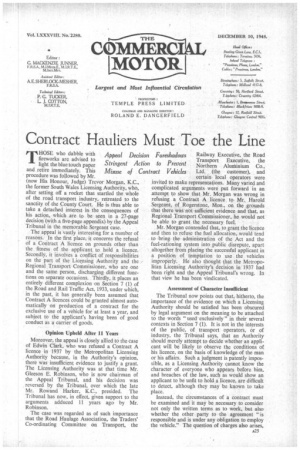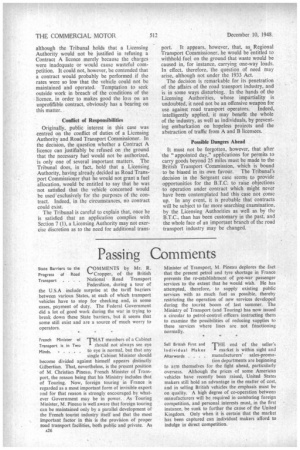Contract Hauliers Must Toe the Line
Page 27

Page 28

If you've noticed an error in this article please click here to report it so we can fix it.
THOSE who dabble with fireworks are advised to light the blue touch paper and retire immediately. This procedure was followed by Mr. (now His Honour, Judge) Trevor Morgan, K.C., the former South Wales Licensing Authority, who, after setting off a rocket that startled the whole of the road transport industry, retreated to the sanctity of the County Court. He is thus able to take a detached interest in the consequences of his action, which are to be seen in a 27-page decision (with a five-page appendix) by the Appeal Tribunal in the memorable Sergeant case.
The appeal is vastly interesting for a number of reasons. In the first place, it concerns the refusal of a Contract A licence on grounds other than the fitness of the applicant to hold a licence. Secondly, it involves a conflict of responsibilities on the part of the Licensing Authority and the Regional Transport Commissioner, who are one and the same person, discharging different functions on separate occasions. Thirdly, it places an entirely different complexion on Section 7 (1) of the Road and Rail Traffic Act, 1933, under which, in the past, it has generally been assumed that Contract A licences could be granted almost automatically on production of a contract for the exclusive use of a vehicle for at least a year, and subject to the applicant's having been of good conduct as a carrier of goods.
Appeal Decision Stringent Action Misuse of Coat
Opinion Upheld After 11 Years Moreover, the appeal is closely allied to the case of Edwin Clark, who was refused a Contract A licence in 1937 by the Metropolitan Licensing Authority because, in the Authority's opinion, there was insufficient evidence to justify a grant. The Licensing Authority was at that time Mr. Gleeson E. Robinson, who is now chairman of the Appeal Tribunal, and his decision was reversed by the Tribunal, over which the late Mr. Rowand Harker, K.C., presided. The Tribunal has now, in effect, given support to the arguments adduced 11 years ago by Mr. Robinson.
The case was regarded as of such importance that the Road Haulage Association, the Traders' Co-ordinating Committee on Transport, the Railway Executive, the Road Transport Executive, the Northern Aluniinium Co., Ltd. (the customer), and certain local operators were invited to make representations. Many varied and complicated arguments were put forward in an attempt to show that Mr. Morgan was wrong in refusing a Contract A licence to Mr. Harold Sergeant, of Rogerstone, Mon., on the grounds that there was not sufficient evidence and that, as Regional Transport Commissioner, he would not be able to grant the necessary fuel.
Mr. Morgan contended that, to grant the licence and then to refuse the fuel allocation, would tend to bring the administration of the Act and the fuel-rationing system into public disrepute, apart altogether from placing the successful applicant in a position of temptation to use the vehicles improperly. He also thought that the Metropolitan Licensing Authority's decision in 1937 had been right and the Appeal Tribunal's wrong. In that view he has been vindicated.
Foreshadows to Prevent ract Vehicles
Assessment of Character Insufficient The Tribunal now points out that, hitherto, the importance of the evidence on which a Licensing Authority should be satisfied has been obscured by legal argument on the meaning to be attached to the words "used exclusively" in their several contexts in Section 7 (1). It is not in the interests of the public, of transport operators, or of industry, the Tribunal says, that an Authority should merely attempt to decide whether an applicant will be likely to observe the conditions of his licence, on the basis of knowledge of the man or his affairs. Such a judgment is patently impossible, as a Licensing Authority cannot know the character of everyone who appears before him, and breaches of the law, such as would show an applicant to be unfit to hold a licence, are difficult to detect, although they may be known to take place. Instead, the circumstances of a contract must be examined and it may be necessary to consider not only the written terms as to work, but also whether the other party to the agreement "is responsible and is under any obligation to employ the vehicle." The question of charges also arises, although the Tribunal holds that a Licensing Authority would not be justified in refusing a Contract A licence merely because the charges were inadequate or would cause wasteful competition. It could not, however, be contended that a contract would probably be performed if the rates were so low that the vehicle could not be maintained and operated. Temptation to seek outside work in breachof the conditions of the licence, in order to makes good the loss on an unprofitable contract, obviously has a bearing on this matter.
Conflict of Responsibilities Originally, public interest in this case was centred on the conflict of duties of a Licensing Authority and Road Transport Commissioner. In the decision, the question whether a Contract A licence can justifiably be refused on the ground that the necessary fuel would not be authorized. is only one of several important matters. The Tribunal does, in fact, hold that a Licensing Authority, having already decided as Road Transport Commissioner that he would not grant a fuel allocation, would be entitled to say that he was not satisfied that the vehicle concerned would be used exclusively for the purposes of the contract. Indeed, in the circumstances, no contract could exist.
The Tribunal is careful to explain that, once he is satisfied that an application complies with Section 7 (1), a Licensing Authority may not exercise discretion as to the need for additional trans port. It appears, however, that, as Regional Transport Commissioner, he would be entitled to withhold fuel on the ground that waste would be caused in. for instance, carrying one-way loads. In effect, therefore, the question of need may arise, although not under the 1933 Act.
The decision is remarkable for its penetration of the affairs of the road transport industry, and is in some ways disturbing.. In the hands of the Licensing Authorities, whose impartiality is undoubted, it need not be an offensive weapon for use against road transport operators. Indeed, intelligently applied, it may benefit the whole of the industry, as well as individuals, by preventing embarkation on hopeless projects and the abstraction of traffic from A and B licensees.
Possible Dangers Ahead It must not be forgotten, however, that after the "appointed day," applications for permits to carry goods beyond 25 miles must be made to the British Transport Commission, which is bound to be biased in its own favour. The Tribunal's decision in the Sergeant case seems to provide opportunities for the B.T.C. to raise objections to operation under contract which might never have been contemplated had this case not conic up. In any event, it is probable that contracts will be subject to far more searching examination, by the Licensing Authorities as well as by the B.T.C., than has been customary in the past, and the whole face of an important branch of the road transport industry may be changed.
























































































